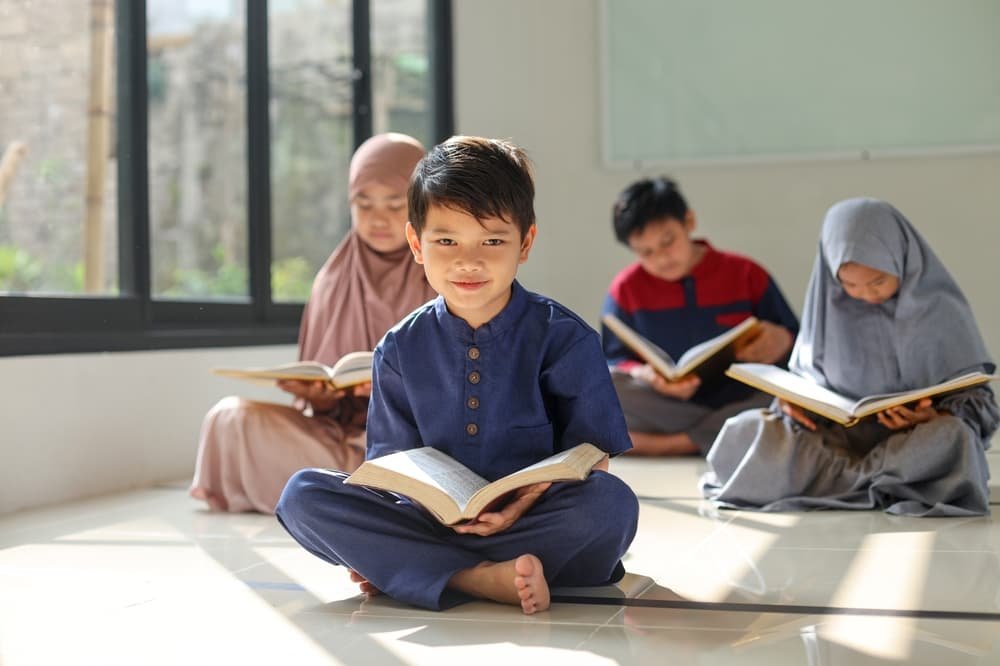Parents devote their lives to us, serving as treasures from heaven, angels in human form who spread their wings of mercy over their children. The Quran emphasizes the importance of respecting and honoring these remarkable figures. God strongly demands that believers show respect and kindness to their parents in the Quran. What specific guidance does the Quran offer on the treatment of parents? How does it address the unique challenges faced by mothers in raising their children? What are the repercussions of ignoring these commands?
In this article, we will explore the profound teachings of the Quran regarding parents, revealing insights into how these enduring principles can be applied in today’s world to strengthen family bonds and foster social well-being. We will delve into the specific guidance the Quran provides, the importance of parents in the Quran and the Islamic faith, and the practical lessons we can draw to navigate modern familial issues.

What Allah says about parents in the Quran
Many ayahs about parents in the Quran emphasize respecting them:
The Quran’s Emphasis on Parents
In Surah An-Nisa, verse 36, God emphasizes monotheism and immediately follows with instructions to treat parents with kindness. This underscores the Quran’s high regard for parental respect and highlights its integral role alongside monotheistic beliefs.
وَاعْبُدُوا اللَّهَ وَلَا تُشْرِكُوا بِهِ شَيْئًا ۖ وَبِالْوَالِدَيْنِ إِحْسَانًا وَبِذِي الْقُرْبَىٰ وَالْيَتَامَىٰ وَالْمَسَاكِينِ وَالْجَارِ ذِي الْقُرْبَىٰ وَالْجَارِ الْجُنُبِ وَالصَّاحِبِ بِالْجَنبِ وَابْنِ السَّبِيلِ وَمَا مَلَكَتْ أَيْمَانُكُمْ ۗ إِنَّ اللَّهَ لَا يُحِبُّ مَن كَانَ مُخْتَالًا فَخُورًا
- “And worship God and ascribe no partner to Him. And behave kindly towards [your] parents, relatives, orphans, the needy, your near neighbors, colleagues, far neighbors [strangers], travelers, and your slaves. Indeed, God does not like an arrogant who boasts.” (4:36)
(وَقُلْ رَبِّ ارْحَمْهُمَا كَمَا رَبَّيَانِي صَغِيرًا)
- “And say, ‘My Lord, have mercy upon them as they brought me up [when I was] small.'”
This verse instructs believers to supplicate for their parents, acknowledging their role in nurturing and upbringing with a prayer for Allah’s mercy upon them. It emphasizes the importance of gratitude and kindness towards parents, highlighting their significant contribution to one’s life from early childhood.
10 Tips for Communicating with Your Parents in the Quran
1. Choose the Right Moment:
– Wait for a time when your parents are not tired, hungry, or angry. A conversation after Salat al-jama’ah can be an ideal time to start.
2. Keep a Cool Head:
– Ensure you are calm before speaking with your parents. Take a deep breath and remind yourself of Allah’s presence to help maintain composure.
3. State Issues Respectfully:
– Address your parents’ concerns first before presenting your own. This shows respect and a willingness to find common ground.
4. Be Patient and Trustful (Sabr and Tawakal):
– Even if things don’t go as planned, stay patient and trust in Allah’s wisdom. Respect your parents’ decisions, even if you disagree.
5. Lower Your Voice:
– Speak calmly and avoid raising your voice. As the Quran advises, “Lower your voice, for the ugliest of all voices is certainly the braying of donkeys” (Surah Luqman: 19).
وَاغْضُضْ مِن صَوْتِكَ ۚ إِنَّ أَنكَرَ الْأَصْوَاتِ لَصَوْتُ الْحَمِيرِ﴾
6. Use Respectful Language:
– Address your parents with respectful and kind words, avoiding any expression of frustration or irritation.
7. Understand Their Perspective:
– Show empathy and try to understand your parents’ viewpoint before presenting your own concerns.
8. Avoid Confrontation:
– Prevent arguments by approaching discussions with the intention of understanding and resolving, rather than confronting.
9. Express Gratitude:
– Regularly express appreciation for your parents’ efforts and sacrifices. Gratitude strengthens bonds and fosters mutual respect.
10. Invoke Allah’s Guidance:
– Seek Allah’s help and guidance before discussing important matters with your parents, ensuring your intentions are pure and respectful.
Read about:
Islamic Topics For Kids: 7 Engaging Activities To Apply
Understanding the 5 Pillars of Islam: A Comprehensive Guide
obedience to parents in the Quran
Parents in the Hadith:
- Abu Hurairah (may Allah be pleased with him) narrated that a man came to the Prophet Muhammad (peace be upon him) and asked, “Who is most deserving of my good companionship?” The Prophet replied, “Your mother.” The man asked again, “Then who?” The Prophet repeated, “Your mother.” The man asked a third time, “Then who?” Again, the Prophet said, “Your mother.” The man asked once more, “Then who?” Finally, the Prophet said, “Your father.”
عن أبي هريرة رضي الله عنه قال: (جاء رجل إلى رسول الله صلى الله عليه وسلم فقال: من أحق الناس بحسن صَحابتي؟ قال: أمُّك، قال: ثم من؟ قال: أمك؟ قال: ثم من؟ قال: أمُّك، قال: ثم من؟ قال: أبوك)
- “I asked the Prophet (peace be upon him), ‘Which deed is most beloved to Allah?’ He said, ‘Performing the prayer at its appointed time.’ I asked, ‘Then what?’ He said, ‘Kindness and dutifulness to parents.’ I asked, ‘Then what?’ He said, ‘Jihad in the cause of Allah.'” (Narrated by Bukhari)
(سألتُ النبيَّ صلى الله عليه وسلم أيُّ العملِ أحبُّ إلى الله؟ قال: الصلاة على وقتها، قُلْتُ: ثم أيّ؟، قال: بر الوالدين، قلت: ثم أيّ، قال: الجهاد في سبيل الله) رواه البخاري.
In Islam, respecting parents is of utmost importance as emphasized by the Prophet Muhammad (peace be upon him). He taught that the best companionship should first be given to one’s mother, repeating this three times before mentioning the father. Additionally, the Prophet highlighted that kindness and dutifulness to parents are among the most beloved deeds to Allah after performing prayers on time. These teachings underscore the high regard Islam places on honoring, respecting, and caring for parents as a fundamental aspect of religious and ethical practice.
Parents in holy Quran:
“And We have enjoined upon man goodness to his parents.” (Quran 29:8)
وقال سبحانه: ﴿ وَوَصَّيْنَا الْإِنْسَانَ بِوَالِدَيْهِ حُسْنًا ﴾ [العنكبوت: 8].
This verse from Surah Al-Ankabut (The Spider) emphasizes the divine injunction to treat parents with kindness, respect, and excellence. It underscores the ethical and moral duty incumbent upon every individual to honor and care for their parents, reflecting the foundational values of family and social harmony in Islam.
surah for parents in the Quran
One of the prominent surahs in the Quran that emphasizes the importance of parents is Surah Al-Isra (also known as Surah Bani Isra’il), specifically verse 23. This verse highlights God’s command to worship Him alone and immediately follows with the directive to treat parents with kindness and respect:
وَقَضَىٰ رَبُّكَ أَلَّا تَعْبُدُوا إِلَّا إِيَّاهُ وَبِالْوَالِدَيْنِ إِحْسَانًا ۚ
“And your Lord has decreed that you not worship except Him, and to parents, good treatment.” (Quran 17:23)
This verse succinctly encapsulates the Quranic principle of honoring and respecting parents as a fundamental duty alongside worshiping God.
what the Quran says about parents’ rights
There are many rights regarding parents in the Quran, These points reflect the Quran’s comprehensive guidance on the rights and duties of children towards their parents in Islam.:
1. Respect and Kindness:
Commanded to treat parents with utmost respect and kindness.
2. Obedience (within Islamic bounds):
Instructed to obey parents except in matters conflicting with Islamic teachings.
3. Gratitude:
Emphasizes gratitude towards parents for their care and upbringing.
4. Support in Old Age:
Encouraged to care for parents, particularly in their old age, with patience and compassion.
5. Supplication:
Directed to pray for parents’ well-being and seek forgiveness for them (Quran 17:24).
How many times are parents mentioned in the Quran?
Respecting and obeying parents, as well as maintaining proper conduct towards them, and warning against disobedience to them, are clearly and explicitly mentioned in both the Quran and the purified Sunnah. These principles and parents in the Quran are reiterated 7 times in the Quran, underscoring their significance in Islamic teachings.
What Are the Responsibilities of Parents in the Quran?
According to the Quran, parents in the Quran are responsible for:
- Education: Providing moral and religious guidance to their children (Quran 31:14).
- Protection: Ensuring the safety and well-being of their children, both physically and spiritually.
- Role Modeling: Setting a positive example in behavior and attitude that children can emulate.
- Prayers for Children: Making supplications for the success, guidance, and well-being of their children (Quran 71:28).
Why Are Parents Important in the Quran?
Parents are crucial in the Quran for several reasons:
1. Divine Command:
The Quran mandates kindness and respect towards parents as a fundamental aspect of Islamic ethics (Quran 17:23).
2. Foundation of Society:
Parents are recognized as the primary educators and caretakers, essential for the moral upbringing and stability of future generations.
3. Reflection of Mercy:
The relationship between parents and children reflects divine attributes of mercy, care, and responsibility, emphasizing the importance of family in Islam.
4. Inheritance of Values:
Parents pass down religious teachings, moral values, and cultural heritage, shaping the spiritual and social identity of their children.
5. Spiritual Growth:
Honoring and serving parents is viewed as a means of spiritual growth and attaining God’s pleasure, reinforcing the importance of family bonds in Islam.

Where Can Parents Find Support in the Quran?
Parents find support through guidance on effective parenting from the stories of prophets, encouragement to seek Allah’s help in fulfilling responsibilities, examples of parental patience, parents in the Quran, and perseverance in challenging situations. These teachings provide invaluable wisdom and inspiration for nurturing righteous children.